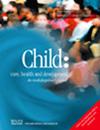An Investigation Into Gross Motor Skill Intervention Provisions for Children With Developmental Coordination Disorder in the Republic of Ireland: Cross Sectional Study
Abstract
Background
Children with Developmental Coordination Disorder (DCD) often experience gross motor (GM) challenges. Left untreated, children may experience lasting physical, social and emotional repercussions. Limited information is available on the accessibility of GM-specific interventions.
Objectives
The study objectives were to identify, (1) past intervention experiences, (2) present provisions and needs and (3) barriers which may prevent children from receiving future GM intervention.
Method
A modified Delphi technique was used for the online survey development. Parents of children with DCD were recruited through voluntary DCD support organisations, social media and existing participants. Frequency analysis was used for fixed response questions.
Results
Completed by 237 parents of children with DCD, this survey represented 70.8% males (n = 168); 28.7% females (n = 68); 0.5% not specified (n = 1) with a median age of 10.0 (IQR = 3.0) and diagnosis age of 7.0 (IQR = 3.0). Referrals were to occupational therapists (OT) (63.5%) for activities of daily living (30.9%) and GM challenges (29.0%). Waiting lists were prevalent (76%) with 43.9% waiting longer than 12 months for intervention. Lengthy wait times for publicly funded intervention programs (61.0%) and cost-prohibitive private therapy (26.2%) were cited as the primary reasons for some not yet receiving GM skill intervention. Few parents are involved in the interventions (14.3%), yet most parents (98.6%) expressed a willingness to help.
Conclusion
GM dysfunction is a primary concern of DCD noted by parents and teachers, yet delayed diagnosis and lengthy waiting lists prohibit children from receiving timely and targeted GM intervention. Alternative methods of delivery with parental involvement should be considered to accommodate the vast numbers of children in need.
Summary
- Occupational therapists (OTs) and teachers are identified as the top providers of motor skill intervention for children with Developmental Coordination Disorder (DCD).
- Gross motor (GM) challenges are a primary concern for children with DCD, yet the treatment received likely prioritises activities of daily living (ADL) over GM difficulties.
- Targeted GM intervention is necessary but not often available due to lengthy waiting lists for publicly funded programmes and the high cost of private treatment.
- Although parents express a willingness to participate in the intervention process, their involvement is infrequently utilised.
- Collaborations between parents, teachers and therapists should be considered to make intervention more accessible and effective.


 求助内容:
求助内容: 应助结果提醒方式:
应助结果提醒方式:


